Michael Fichman

Cities, Data, Arts, Music, Community
Associate Professor of Practice
University of Pennsylvania
Weitzman School of Design
Dept. of City and Regional Planning
Masters of Urban Spatial Analytics Program
Researcher & Consultant
PennPraxis
Data Scientist
Center for Safe Mobility
I’m a data-savvy city planner and educator working in a range of fields, including nighttime economies, arts and culture, smart cities, transportation, parks and open space, and more.
Practice Areas
- Nighttime Arts and Culture - Planning and Advocacy
- Urban Planning Data Analytics and Software Design
- Urban Planning Program and Design Evaluation
- Policy Research
- Teaching
About Me
Nighttime Arts and Culture - Planning and Advocacy
Nashville Independent Venues Study
I’m the lead researcher and consultant for client Metro Nashville and Davidson County. This project’s core purpose is to better understand the ecosystem of independent music venues (IMVs). In the process, the project will detail the threats Independent music venues face, seek to understand the needs and aspirations of the region’s creative community, and propose policy approaches for preserving and growing Independent Music venues as well as the businesses, neighbourhoods, and districts around them.
The project is currently underway and is due to be delivered in early 2024.
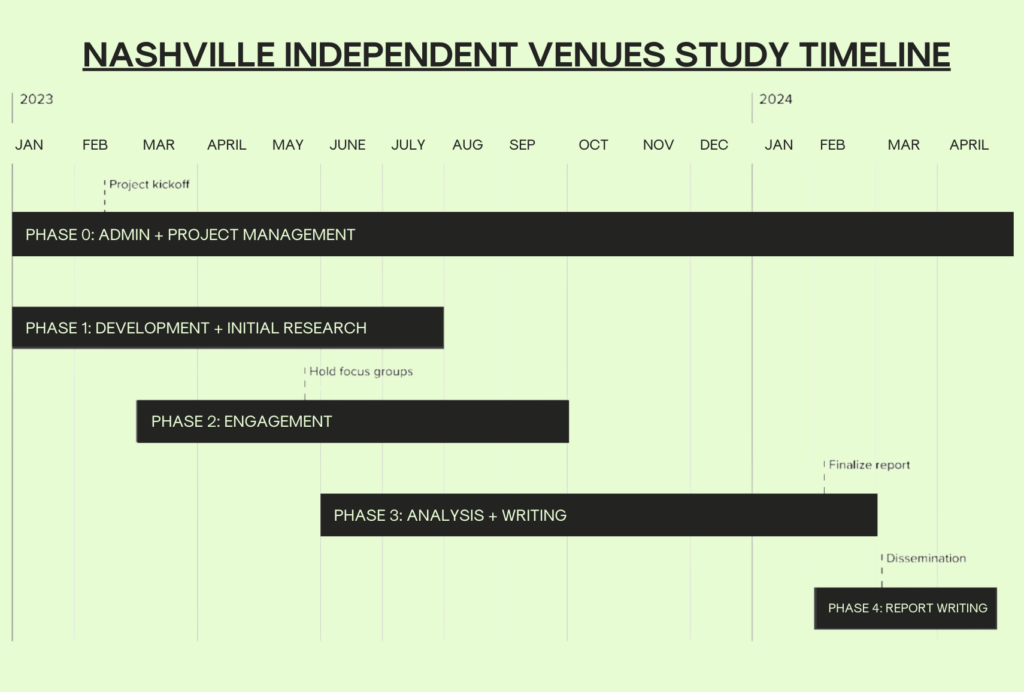
—
Global Nighttime Recovery Plan
“The Nightlife Rescue Plan That Could Save Your City’s Scene” - City Lab
I’m an editor and author of The Global Nighttime Recovery Plan - a collaborative, practical guide for cities that are trying to determine the best way to design and execute a safe and feasible strategy to reopen and reactivate their creative and night-time economies. The guide is a joint effort that involves activists, practitioners, academics and industry representatives from all over the world
Partners on this project include Vibe Lab, PennPraxis, Fraunhofer Institute and the Alexander von Humboldt Foundation. It has been translated into several languages, including Spanish, Japanese and German, and has been a catalyst for local and national planning initiatives in Asia, South America, Africa, Europe and North America.
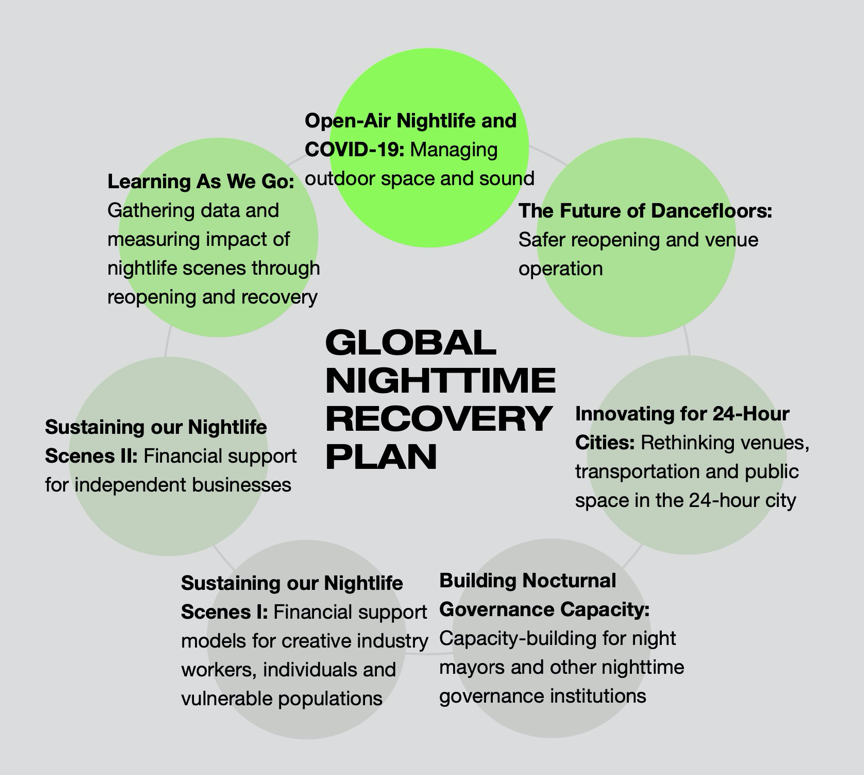
—
Creative Footprint - NYC / Tokyo / Berlin / Stockholm / Montreal / Sydney
Client - Vibe Lab
The Creative Footprint (CFP) is a sociocultural initiative that maps and indexes creative space to measure the impact of nightlife and cultural activity on cities.
I developed a geo-spatial methodology to get deep insights about how creative spaces are related to economic and demographic indicators and how they are affected by land use policies and transportation networks.
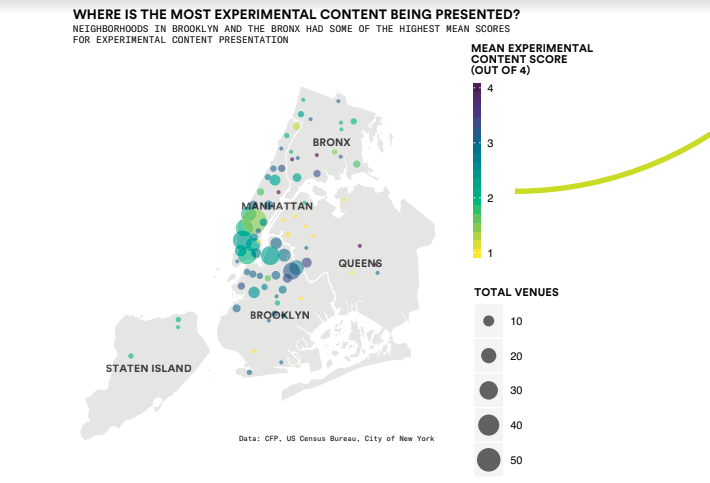
—
24HrPHL
24HrPHL is a resource and community engagement group in Philadelphia’s nightlife arts and culture community. I was a founding member of this group in 2017. We have created programs and resources including sexual harrassment identification and de-escalation training for venues, survey research and policy engagement, venue opening guides, harm reduction toolkits, directories of COVID-related resources, and more.
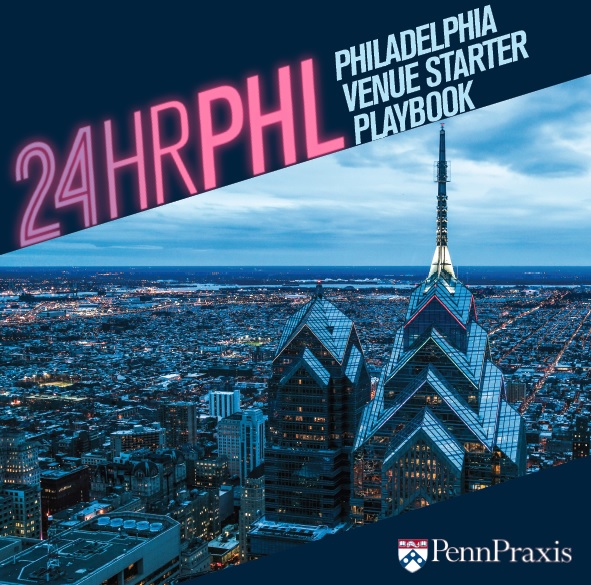
—
Philadelphia City Council Arts and Culture Task Force
As a member of the ACTF (and chair of it’s nightlife commitee) I drafted recommendations to City Council including calls for licensing reform for creative spaces, harm reduction subsidies for events industries, workers supports, and the creation of a Nighttime Economy Office within the city’s Department of Commerce. The Nighttime Economy Office was budgeted for FY2022 with the support of Council, the Mayor and the City Controller. Our task force was also responsible for the appropriation and disbursement of $1M of grants to independent artists in the City.
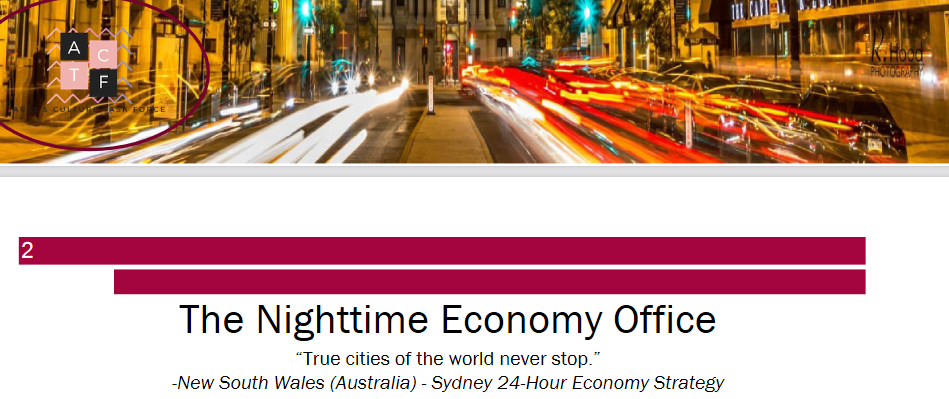
—
Voices of Creatives
I served as the director of research for Voices of Creatives, a project designed to understand the effects of COVID-19 on the creative industries in Iraq, Jordan, Lebanon, Senegal, South Africa and Kenya. This project, undertaken by the German Ministry for Economic Cooperation and Development (German: Deutsche Gesellschaft für Internationale Zusammenarbeit; “GIZ”), was conducted by VibeLab and PennPraxis and with support from the Goethe-Institut.
Our methodology combined focus groups, surveys, spatial maps and economic research - and created a set of priorities for GIZ and other agencies to promote business development and economic recovery in fashion, design, and music industries across and within each country.
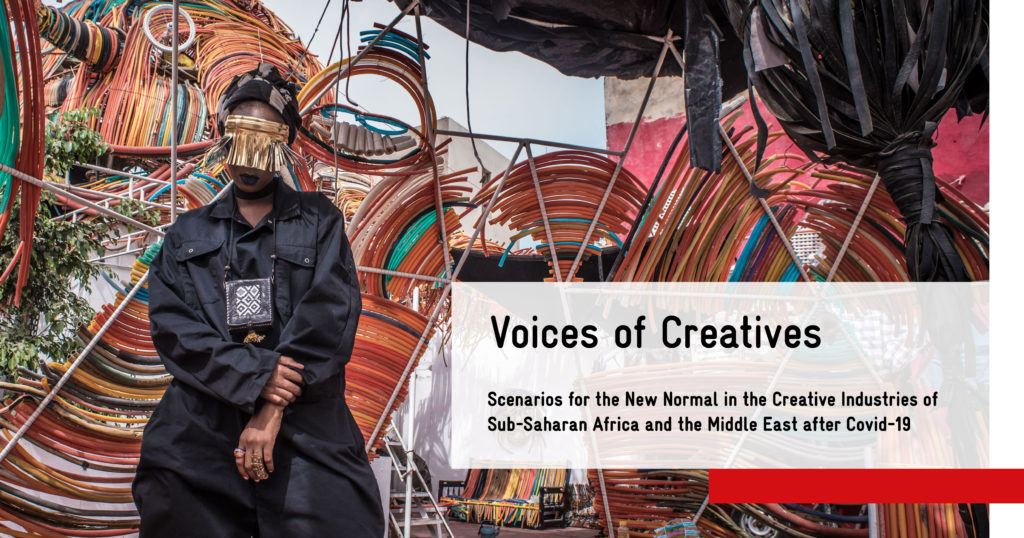
—
Urban Planning Data Analytics and Software Design
Center for Safe Mobility Eye Tracking
I am the lead Data Scientist on the Center for Safe Mobility’s research team. The research group is deploying a wearable sensor technology called Tobii to understand how the built environment affects walkers, cyclists, and more. I’ve built custom software in R to analyze the sensor data—which measures dozens of bio-metric indicators in 10 millisecond increments—and relate user stress in response to the features of the built environment. Our work has been published and widely publicized as a new approach to building safer transportation infrastructure.
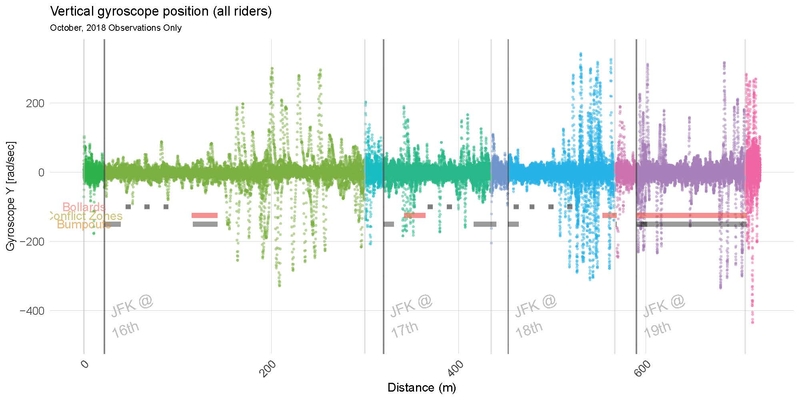
—
Communication Neuroscience Lab - Geoscanning Research Group
I provide geospatial data analysis, software development, and urban planning expertise to a research group examining the relationship between environmental risk factors, observed behavior, and brain activity. Using a wide variety of data sources, including tobacco retailer data, census information, GPS data and CT scans, this project integrates medical, behavioral and public health data using a geographic lens.

—
Urban Planning Program Evaluation
Parks and Open Space
Reimagining The Civic Commons (2016-17)
PennPraxis worked with the Fairmount Park Conservancy (FPC) in conjunction with the Philadelphia pilot of the Reimagining the Civic Commons initiative, funded by the Knight Foundation, William Penn Foundation, and JPB Foundation. The initiative united partners from five key civic assets in Philadelphia—Bartram’s Mile, Discovery Center, The Viaduct Rail Park, Lovett Library and Park, and Centennial Commons—that were undergoing phased redesigns beginning in the summer of 2016. PennPraxis assisted in the design and implementation of data collection and baseline monitoring to document the impacts of the initial phases of implementation. PennPraxis deployed a team to collect this information using site observation, intercept surveys, and user counts to create bases of data to measure future impacts.
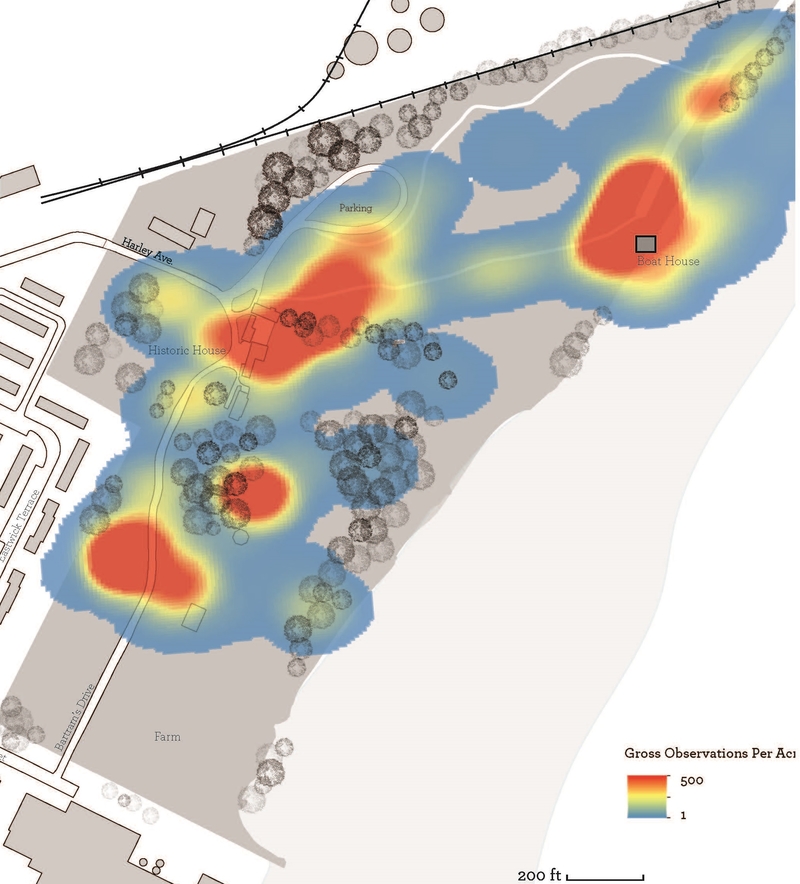
—
OvalPHL / The Oval Program Evaluation (2017-18)
PennPraxis developed software for documenting site usage and mapping spatial data for a variety of sites and questions. In 2017 and 2018, PORT Architecture + Urbanism designed temporary pop-up public space installations at Eakins Oval, and hired PennPraxis to collect data on visitors for the Fairmount Park Conservancy.
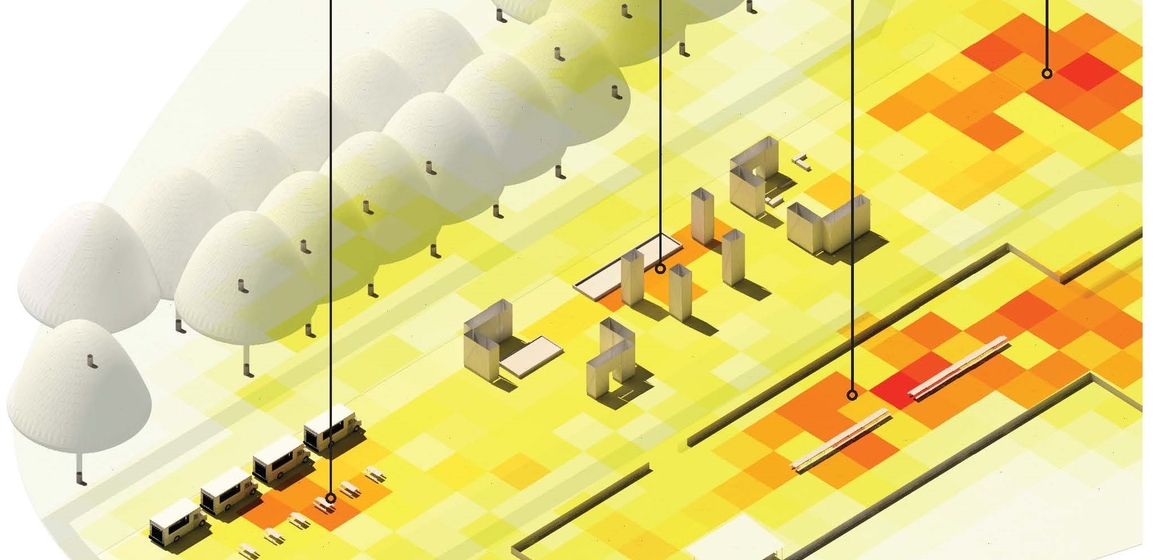
—
Transportation
University of Pennsylvania Commuter Survey (2023)
Co-PI of a commuter behavior survey for the University of Pennsylvania Facilities and Real Estate Services, Business Services and Human Resources. This survey will help FRES understand how people got to work and travel long-distance for work. With these new, up-to-date data, FRES and other University divisions can create more robust programs to encourage sustainable community choices, including taking transit, walking, carpooling, and biking, and more sustainable choices for long-distance travel as well. This project made use of custom API route-generation software we developed to make cost and distance-driven commuter choice models with thousands of subjects. (Image courtesy Penn FRES)
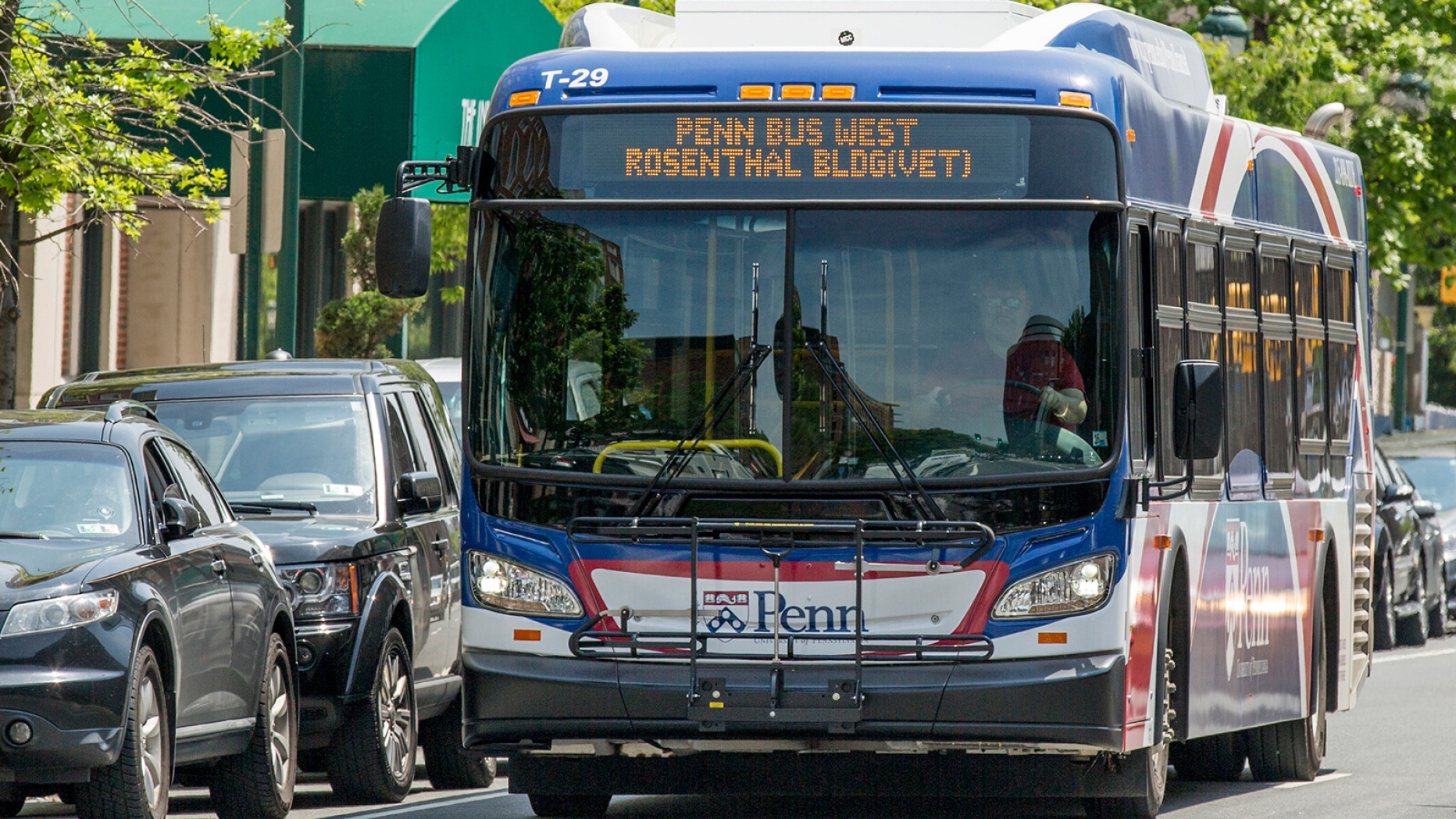
—
An Evaluation of Pittsburgh’s Dynamically Priced Curb Parking Pilot (2016)
An econometric analysis of one of the first dynamic, demand-based curb parking programs in the US. Uses custom occupancy estimations algorithms to create elasticity estimations and estimates price effects using regression discontinuity quasi-experimental models.
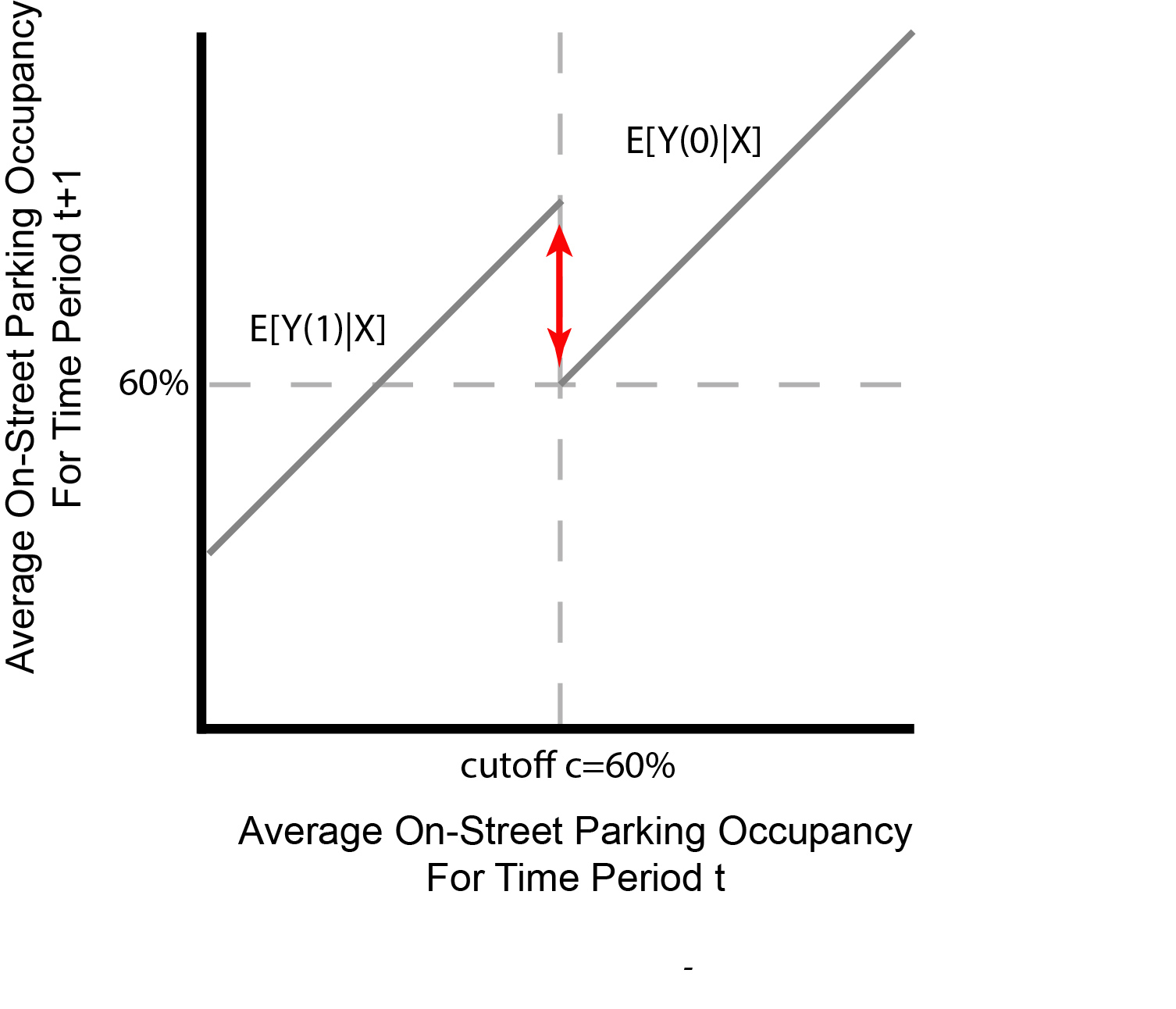
—
Open Streets Program Evaluation (2016)
Assisted in the design and implementation of an in person survey campaign to measure use and demographics associated with Philadelphia’s first “Open Streets” event. Client: Philly Free Streets
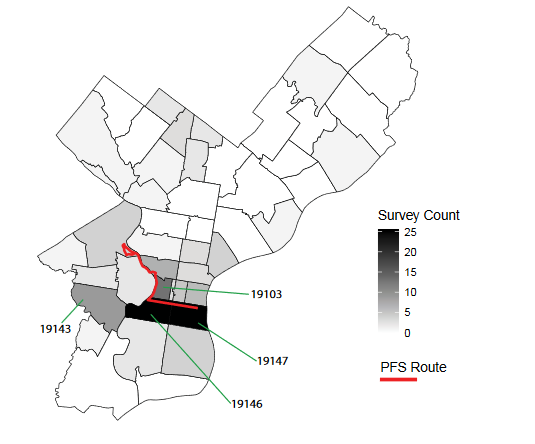
—
Historic Preservation
Sacred Places, Civic Spaces (2019)
Conducted a survey-based evaluation process for the Infill Philadelphia: Sacred Places / Civic Spaces project, a partnership between the Community Design Collaborative and Partners for Sacred Places, with North 4th LLC as project managers. The two-year project seeks to re-envision underutilized, purpose-built religious properties in Philadelphia as community hubs, adding the design and development community’s voice to a growing dialogue about the intersection between historic sacred places and communities.
—
Housing
Leonard Davis Institute & Housing Initiative at Penn (2019)
Created a spatial data analysis design and software suite for a research group examining the relationship between housing interventions and public health. Our work led to the publication of a paper, publicized in the Wall Street Journal and New York Times, which shows a causal link between the disbursement of Philadelphia’s Basic Systems Repair Program services (small home repair grants and case management) and a reduction in violent crime on blocks receiving interventions.
—
Policy Research
Civic Infrastructure - Economic Inclusion (2018)
White paper on economic inclusion strategies in public capital investment programs. Written as part of a multi-year research project with PennPraxis funded by The William Penn Foundation.
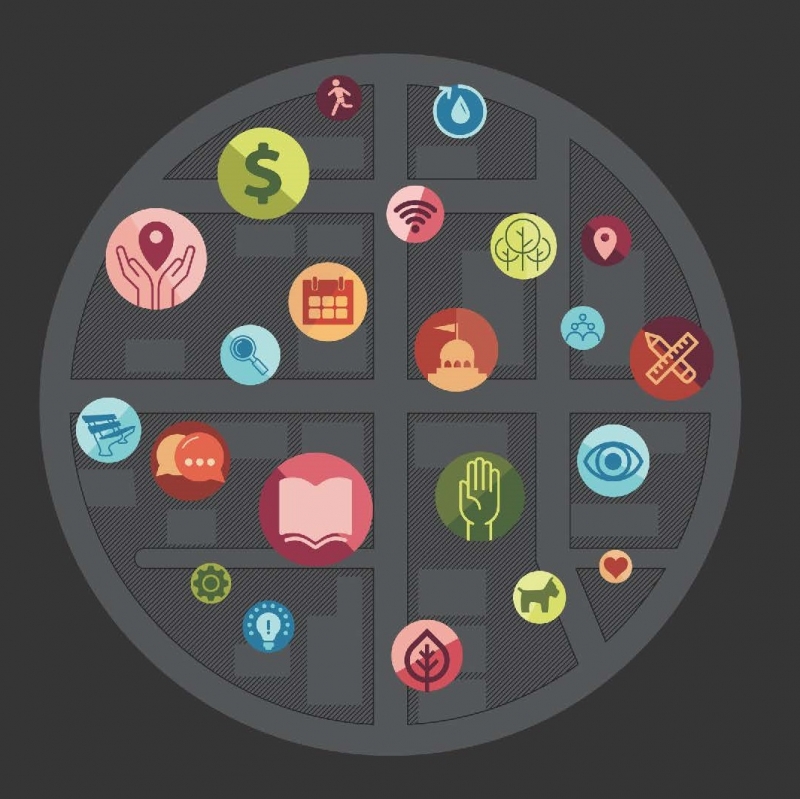
—
Glassboro NJ Growth Management Plan
Ongoing PennPraxis planning process to create a long-term strategy for growth for this rapidly changing University town.
—
Teaching
I have taught many classes over the years at University of Pennsylvania’s Weitzman School of Design, where I was the Interim Director of the Master of Urban Spatial Analytics Graduate program in 2021 and 2022. Courses I have taught include -
- MUSA 801 - Smart Cities Graduate Practicum
- CPLN 675 - Land Use and Environmental Modeling
- MUSA 508 - Public Policy Analytics
- CPLN 501 Lab - Quantitative Planning Analysis Methods Lab
- MUSA 795 - Spatial Analysis Summer “Bootcamp” Mini
- PennPraxis Design Fellows Program
Press - Quotes and Features
- Resident Advisor (2023)
Clubbing Is Becoming Big Business. What Does This Mean for Dance Music? - Philadelphia Inquirer (2023)
‘Less happy hour, more night life’ has some Philly businesses seeing an increase in late-night spending - Philadelphia Magazine (2023)
A Night in the Life of the Night Mayor - The Pennsylvania Gazette (2022)
Night Fever (Bio feature) - Philadelphia Inquirer (2022)
Four ways to promote Philly’s nightlife as a possible antidote to nuisance and violence (Op-Ed) - Pennsylvania Gazette (2022)
Night Fever (Profile) - Bloomberg City Lab (2020)
The Nightlife Rescue Plan That Could Save Your City’s Scene - The New York Times (2018)
New York Today: The Nightlife Mayor’s Citywide Tour - Bloomberg City Lab (2018)
What Small, Diverse Music Venues Mean to New York City - Philadelphia Inquirer (2020)
Op-Ed: Philadelphia Should Become a 24-Hour City to Survive the Pandemic - PennToday (2021)
A New Metric for Designing Safer Streets - PennToday (2021)
Reviving Philadelphia’s Nighttime Economy - The Paper (China) (2020)
Michael Fichman: The Global Nighttime Economy Needs A Recovery Plan - Crain’s Detroit Business (2020)
Detroit’s Nightlife Coming Back At a Cautious Pace - 880 Cities (2017)
20 Emerging City Champions Chosen to Lead Innovative Urban Projects - Resident Advisor (2022)
Can Climate Offsets Help Reduce Dance Music’s Carbon Footprint? - PennToday (2020)
Safely reengaging with nightlife and supporting the creative economy - Population Health Week (2020)
Podcast: Michael Fichman, MCP Researcher and Lecturer at UPenn - Como (Spain) (2020)
El sector del ocio nocturno lanza una app a nivel mundial para “acceder a los locales de forma segura” - Reeperbahn Festival Pop-and-Politics Workshop (2021)
Video: The Future of Nightlife: Liberty, data, and technology. - Amplify Music Conference (2021)
Video: Session 27 - Rethinking Nightlife - Institute of Licensing (UK) R&R Conference (2021)
Video: Action Planning for Global Nighttime Recovery - 24HourNation (2022)
24 Minutes with Michael Fichman (Podcast) - NextCity (2017)
New Model Could Help Cities Predict Gentrifying Neighborhoods
Awards, Honors, Organizational Memberships
- Recipient - City of Philadelphia Creative Economy Citizens Award (2023)
- Member, Philadelphia City Council Arts and Culture Task Force (2020-Present)
- 880 Cities Emerging City Champions Fellow (2017)
- Knight Cities Challenge Finalist (2017)
- International Nightlife Association Golden Moon Award (with GNRP team) (2020)
- Member, American Planning Association
- Member, Society for American Baseball Research
- Member, NightCap Alliance
Publications
PennPraxis. (2023) University of Pennyslvania Commuter Survey.
VibeLab. (2023). The Creative Footprint Project - Sydney.
VibeLab. (2023). The Creative Footprint Project - Montreal.
VibeLab. (2022). The Creative Footprint Project - Stockholm.
Vibe Lab. (2020 - 2021) Global Nighttime Recovery Plan, Chapters 1-7. (White Paper Series)
I am lead editor of Chapters 3, 4 and lead author of Chapter 7
Ryerson, M. S., Long, C. S., Fichman, M., Davidson, J. H., Scudder, K. N., Kim, M., Katti, R., Poon, G., & Harris, M. D. (2021). Evaluating cyclist biometrics to develop urban transportation safety metrics. Accident; analysis and prevention, 159, 106287. https://doi.org/10.1016/j.aap.2021.106287
Deutsche Gesellschaft für Internationale Zusammenarbeit (GIZ). (2021). “Voices of Creatives: Scenarios for the New Normal in the Creative Industries of Sub-Saharan Africa and the Middle East after Covid-19.”
I was director of research and an author on this institutional publication
Mattan, B. D., Cooper, N., Scholz, C., Fichman, M., Paul, A., Andrews, M. E., Johnson, D., Carreras-Tartak, J., Cakar, M., Hao, S., Beard, E., Barnett, I., Strasser, A., Kirchner, T., & Falk, E. B. (2021, April). Impact of mood on smoking through cravings in disadvantaged neighborhoods. Annual meeting of the Midwestern Psychological Association, 2021.
Fichman, Michael, Manning, R., Burton, E., and Park, K. (2021). City of Philadelphia Nighttime Economy Office: Proposal 2021.
Fichman, Michael. (2020, May 14) Opinion: Philadelphia should become a 24-hour city to survive the pandemic.. Philadelphia Inquirer.
VibeLab. (2020). The Creative Footprint Project - Tokyo.
Fichman, Michael A (2018). Civic Infrastructure 2018, Appendix: Economic Inclusion. DOI: 10.13140/RG.2.2.29450.98243.
VibeLab. (2018). The Creative Footprint Project - New York City.
Steif, K. Mallach, A. Fichman, M. Kassel, S. (2016). Predicting gentrification using longitudinal census data. Urban Spatial. (White Paper)
Fichman, M. (2016). An Evaluation of Pittsburgh’s Dynamically‐Priced Curb Parking Pilot. DOI: 10.13140/RG.2.2.16274.25289
Fichman, M and M.A Fichman. (2012) From Darwin to the Diamond: How Baseball and Billy Beane Arrived at Moneyball. Available at SSRN 2112109.
Education
- Masters of City and Regional Planning, U. of Pennsylvania (2016)
- BS, Biology, Haverford College (2005)
- SES Cert., Marine Biological Laboratory, Woods Hole, MA (2004)
Contact
Get in touch with me at mfichman at gmail dot com or mfichman at design dot upenn dot edu.